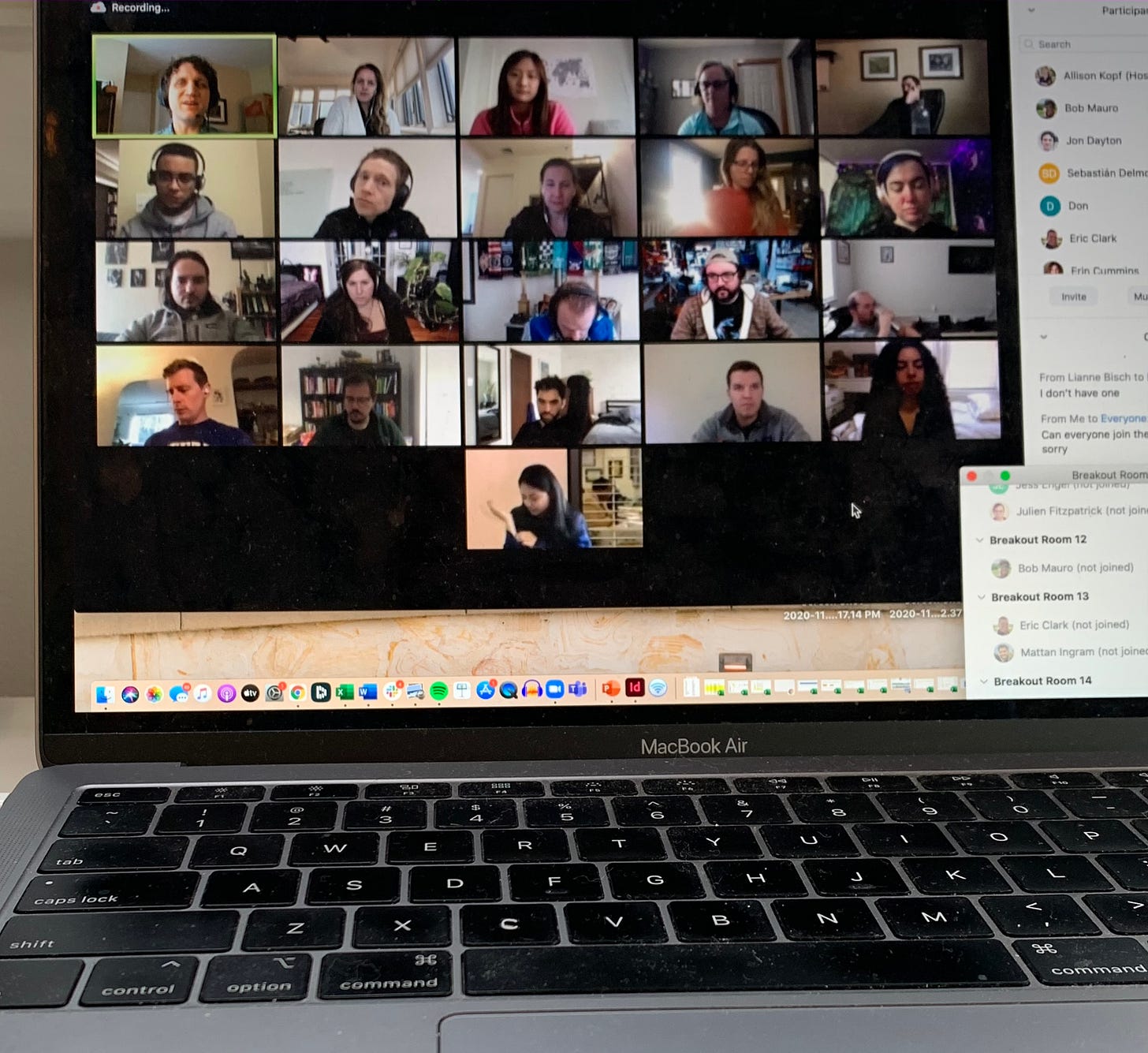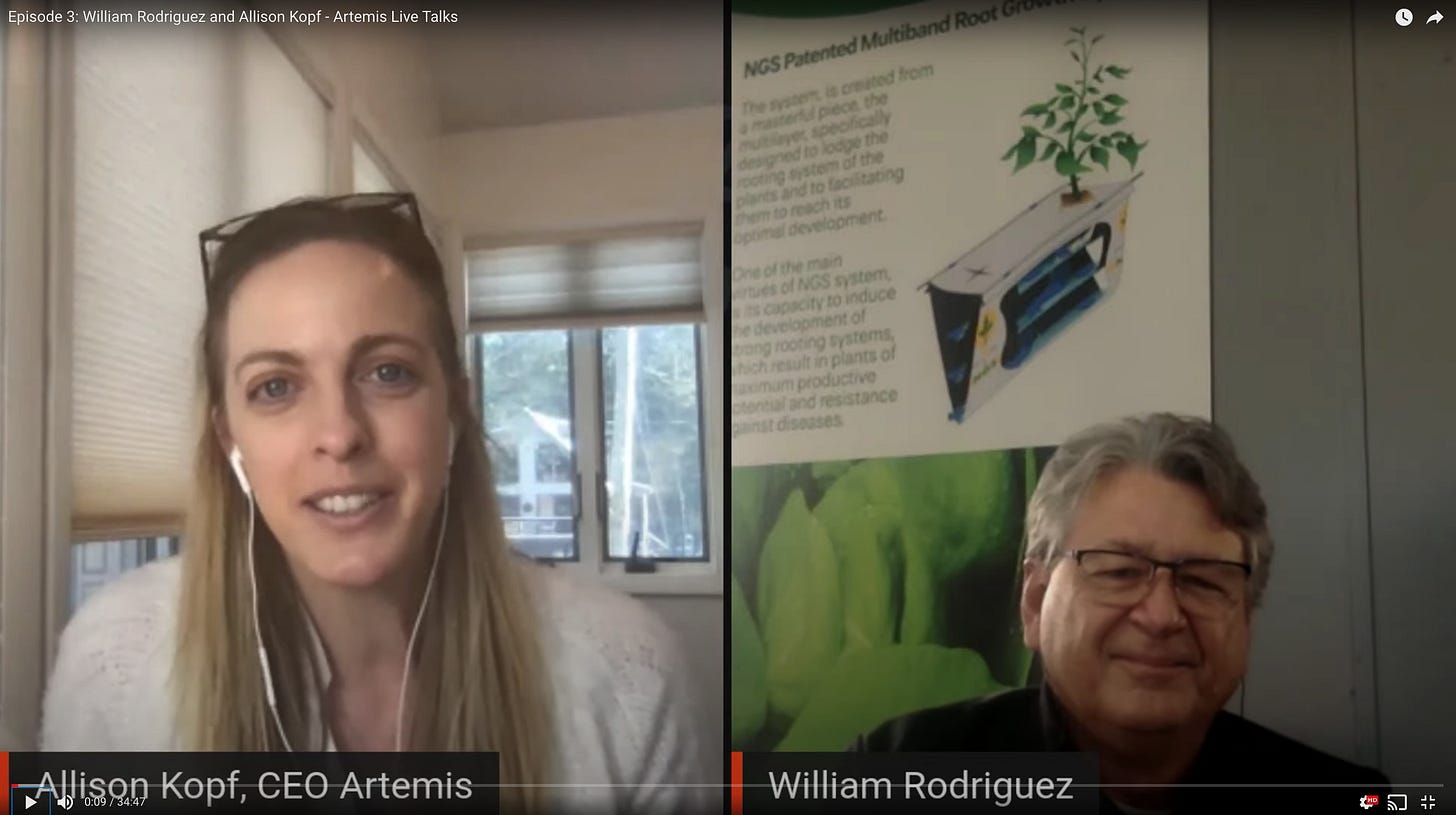snippets #14 - 1.27
On virtual team building
Got a few followup questions on the last newsletter. A few folks asked which “dimes (risks)” are most difficult for startups to take off the table. The short answer is, it depends on the business, stage, and what you’re trying to do. That said, below are a few risks I think tend to be pretty difficult for most folks at any stage:
Is the product something people really want/need? We all have ideas of things the world should create because we think they’re great. That doesn’t mean people will actually buy that thing (or use it). In the early stages, it’s critical to prove that there is a real need or want for the thing you’re building so that when you hit the gas, you accelerate and don’t just stall out. Founders often feel false signs of this. A big potential customer gets excited, a bunch of people sign up early on, that sort of thing. You have to cut through the noise to see if the traction is lasting or just temporary.
Can you hire? As founders, we have to hire well and we have to hire fast (and be comfortable firing when we get it wrong). If you’ve made a bunch of mediocre early hires or haven’t shown that you can build a candidate pipeline or haven’t filled any open roles, these are all signs that you won’t be able to scale the team as you keep growing the business. On the flip side, something magical happens when you combine a great idea with a great founder who can hire really well.
Have you proven out the right things? This one is tough to really gauge. Your job is to determine what metrics are most important to the success of your business and then prove them out. A lot of times, similar to the first bullet, we get false impressions that the business is going well because we’ve focused on the wrong things. Sure they may be going well, but if they have no impact on your growth, they’re likely irrelevant.
Is the market really big enough? This is important at every stage of the business. Founders should always be looking at market dynamics. What you’re doing is going to change over time and it’s also going to highlight exactly where in the market you’re trying to win. It’s critical for venture backed companies to make plays in big markets (really big) or alternatively to be a market creating company. Why is this a difficult risk to remove? Markets change, your product changes, your sales plans change. Taking into account the bullets above, your ability to scale in a market changes too.
Virtual Offsites
At my company, we used to hold annual offsites. We were a mostly-remote team and now we’re a fully-remote one, so we place a lot of value on getting together as a full team, in-person every so often.
One year, we all attended Cultivate, a huge horticulture show in Ohio as a team. One year we went to Orlando and some of the team arrived early to visit the hydroponic greenhouse at Epcot. One year we went up to Cornell and spent time visiting their R&D greenhouses. It’s good to get out of the office, go visit a farm, and work on things together, as a team.
Due to COVID, we had to go virtual this year and it was, surprisingly, a lot of fun. It took a lot of planning to get right, and virtual events miss some of the key benefits of in-person activities (like visiting farms), but all in all it was a great experience.
I always recommend holding some sort of multi-day work-adjacent event with your team, whether you work remotely or together in an office. And now, more than ever, it feels especially important to get people away from the normal day-to-day and thinking bigger/more creatively.
Not everything was perfect. It never is. We spent 16 hours over two days on zoom, which is exhausting. We had some sessions flop and some absolute winners. Overall though, everyone had a great time. Below are some of the things I’ve learned along the way. I hope it’s helpful for designing your next team event.
Weekdays only - Don’t plan a work event on a weekend. Nobody wants to do that. Even though you’re “losing” days during the week, plan the offsite during the week. Plus you’re not losing days if done right.
Length - We have always done two days, but I’ve received feedback that longer might be better, with more breaks and socializing opportunities.
Only offsite activities - Set expectations that during the offsite, folks aren’t working on normal things. Think about how distracting it is to try and get something done while paying attention to something else. If someone has to step out of a session to close a big deal or get something urgent done, they should step completely out of the room (or leave the zoom).
Get creative with sessions - This is the most important thing. No one wants to spend two or three days in zoom sessions just thinking about OKRs (Objectives and Key Results) or goal setting. We had a session where we broke into groups and designed a doghouse that went alongside a product ideation/scoping talk. It was awesome.
Mix group sessions and presentations - Not everyone wants to participate all the time. That’s ok. Have some sessions where a teammate presents on a topic they love or something they find interesting. We had a topic on tarot and another on AI/machine vision. I try to mix 30 minute talks with 1 hour group breakout sessions.
Session leaders - You should not be presenting every session. Imagine how boring that would be. I would hate attending a two day seminar with just me talking. Try to get your team to lead the sessions and try to have diversity among leaders. Sessions should be led by folks from engineering, product, sales, customer success, HR, accounting, etc.
Schedule breaks - I never schedule enough breaks. When running offsites remotely, it’s even more important to be intentional about breaks. Is everyone hopping off zoom? Are you having breakout groups so folks can get to know each other? Is it one big group where folks can stay on if they want?
Don’t forget the fun - With virtual events, it’s even more important to think about how you can have fun as a group. One of my favorite sessions was an optional baking class during lunch led by one of our marketing associates. She taught us how to make Brigadeiro, which by the way, are amazing.
Books in my basket
I’ve got a big ‘ole basket of books on my list for this year. A few are on hold at my local bookstore already and a few I’m going to have to dig around to find. Sharing a few in case anyone wants to read with me. What’s on your reading list?
Mediocre: The Dangerous Legacy of White Male America by Ijeoma Oluo
COMPLEXITY: THE EMERGING SCIENCE AT THE EDGE OF ORDER AND CHAOS by M. Mitchell Waldrop
In the Garden of Beasts: Love, Terror, and an American Family in Hitler's Berlin by Erik Larson
Everybody Lies: Big Data, New Data, and What the Internet Can Tell Us About Who We Really Are by Seth Stephens-Davidowitz
The Death and Life of Great American Cities by Jane Jacobs
Podcasts/Video
I started a new live series on LinkedIn called Artemis Live Talks where I interview friends from the ag industry and we talk about indoor agriculture. It’s a ton of fun. The series is every Thursday at 4p ET on our LinkedIn page. Follow us to check it out.
Here are the last three episodes in case you want to catch up.
Also want to give a big shoutout to Mariah Manzano, an awesome founder who started her company, Opal, as a student at Santa Clara University. We first met when I gave a talk at my 5 year reunion (remember in-person events?!) and then again when I mentored the SCU accelerator teams. She reached out to have me on her new podcast and we had a really great chat. Check it out here and give Mariah a follow. I’m looking forward to all the big things coming from her.





